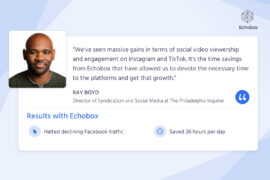In this week’s edition: why is Google facing legal action and damages that could bankrupt a small country? Why have companies been trying to dig up dirt on the Twitter whistleblower? And how could AI help the US find its stones? It’s The Roundup
News
Google is currently having to weather a blizzard of investigations into alleged anti-competitive behavior, with Foo Yun Chee at Reuters reporting that the company faces the prospect of a $25bn lawsuit. The filing, on behalf of online publishers in both the EU and the UK, seeks redress for the loss of substantial ad revenues due to what the suit alleges is its unfair advantage in the ad tech market.
The news comes as a European court upheld a previous decision against Google, this time for anti-competitive behavior in requiring that phones running Google’s Android software come with the company’s apps pre-installed in order to carry its Play Store app.
As we noted a few months back, lawsuits aren’t the only concerns for Google’s ad business. A congressional subcommittee recently proposed a bill that would force Google, and other companies processing over $20bn per year, to scale down their operation to only be involved in 1 aspect of the ad market.
It’s not just Google that’s experiencing legal troubles. As per this article from The New York Times’ Karen Weise and David McCabe, Amazon is being sued by the state of California under antitrust legislation for allegedly forcing sellers on its site to raise their prices on others.
Sellers are forced to pay a higher price to access subsidiary Amazon services such as ad services which many buyers deem a necessary measure to succeed on the platform. But lower overhead costs on other platforms have not resulted in lower prices there. Amazon has been accused of removing the “Buy Now” and “Add to Cart” buttons from sellers’ pages if the company discovers the same seller selling the same product cheaper elsewhere, and thereby nullifying competition.
The news marks the culmination of a 2 year investigation by the California attorney general into Amazon’s own brand of anti-competitive behavior.
Analysis
Since news emerged of allegedly serious security flaws at Twitter, a host of companies have engaged in potentially illegal activities in order to apparently uncover damaging material on the whistleblower, reports Ronan Farrow at the New Yorker.
Former colleagues of Peiter Zatko, Twitter’s ex-head of security who filed his allegations with several federal bodies, have been approached by a number of “research-and-advisory companies” offering significant financial inducements for information on Zatko mere hours after the information became public. Although the identities of the companies who have retained these research firms remain unknown, sources claim that they were looking for information “to guide stock trades,” with share prices set to skyrocket if Elon Musk is forced to complete his deal to buy Twitter.
The judge in the case recently allowed Musk to amend his filing to include Zatko’s allegations, with the trial scheduled to begin next month.

Kids’ TV used to be a broadly wholesome affair (mostly). But what happens when children’s programming shifts onto the internet and turns… weird, and how did it get that way?
Some kids’ shows have always had a slightly subversive edge, but of course YouTube’s monetizable, DIY vibe has ratcheted up the weird a few notches.
In this excerpt from Mark Bergen’s new book, abridged by The Guardian, he tells the all too predictable story of how bedroom-Walt-Disneys glommed on to successful content and gamed YouTube’s “black box” of an algorithm to churn out some pretty disturbing stuff.
AI
Last time on The Roundup, we mentioned Meta’s new chatbot with particularly esoteric tastes in historical figures and a troubling blindspot for bigotry.
Not to be outdone in the “ethically problematic” stakes, Chinese company Baidu’s new ERNIE-ViLG AI image generator has been blocked from producing images that may be “politically sensitive” to the Chinese government, says MIT Tech Review’s Zeyi Yang. Inputs such as “Tiananmen Square” or “Xi Jinping” have been blocked by the AI’s creators, whilst some terms are allowed but not in certain combinations – “democracy” and “Middle East” are OK, but return an error message when put together.
Self-censorship is a factor in the creation of any such technology (OpenAI’s DALL-E 2, for example, doesn’t allow the use of public figures’ faces), but in the absence of any rationale from Baidu about what does and doesn’t constitute prohibited material, the line between moral consideration and political censorship is indistinct.
Lastly this week, the US government has enlisted the help of AI in order to map out the locations of 50 strategically important minerals across the country.
Traditionally, the US has imported the majority of the minerals it uses for things like batteries from abroad, but amidst a tightening supply chain the US Geological Survey has begun to try and map out these mineral deposits domestically. Much of the work seems to involve the digitizing and analyzing of a vast array of existing survey maps, many of which are many decades old.
It’s hoped that these efforts will help to accelerate America’s transition away from carbon-emitting fossil fuels in compliance with the Paris Climate Accords to which it re-signed in the beginning of 2021.

/cloudfront-us-east-2.images.arcpublishing.com/reuters/KKWTEXYFVBOTZPDUB4OBLDEKGE.jpg)






